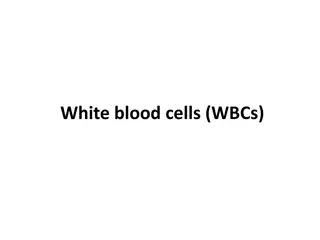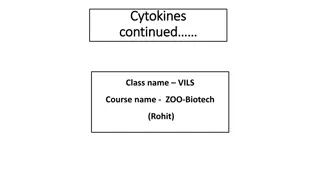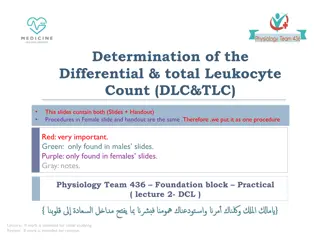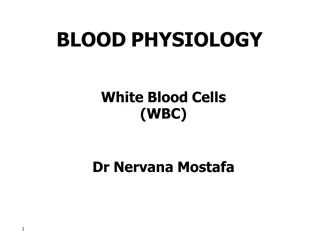Differential white blood cell count
Differential white blood cell count, also known as a leukocyte count, is a crucial test to determine the different types of white blood cells present in the blood. The cells are classified into granulocytes (neutrophils, eosinophils, basophils) and agranulocytes (lymphocytes, monocytes). Blood smear
3 views • 21 slides
Understanding White Blood Cells and Their Classification
White blood cells (WBCs), or leukocytes, are vital elements of the blood responsible for protecting the body against invading organisms. They are classified into granulocytes (neutrophils, eosinophils, basophils) and agranulocytes (monocytes, lymphocytes), each playing specific roles in the immune s
1 views • 28 slides
Understanding the Significance of Cytokines in Immune Response
Cytokines play a crucial role in immune response activation and regulation. They are secreted by various cell types like lymphocytes, monocytes, and macrophages, exerting diverse biological functions, including immune system development, inflammatory response induction, and hematopoiesis regulation.
2 views • 12 slides
Understanding Immunology: Key Players and Processes
Explore the world of immunology through key components such as monocytes, macrophages, lymphocytes, interferons, and the inflammatory reaction. Learn about the roles of various immune cells in defending the body against pathogens and the mechanisms of inflammation in response to tissue damage or inf
0 views • 16 slides
Understanding Differential and Total Leukocyte Count (DLC & TLC)
Differential and Total Leukocyte Count (DLC & TLC) is a crucial test that determines the percentage of different types of white blood cells in the total leukocyte population, aiding in diagnosing various disease processes. The test involves identifying and counting different types of white blood cel
0 views • 18 slides
Understanding White Blood Cell Physiology and Function
Explore the formation, maturation, and functions of white blood cells, focusing on eosinophils, basophils, monocytes, and macrophages. Learn about the roles of these cells in immune responses, including phagocytosis, allergic reactions, and defense against parasites. Gain insights into the complex p
0 views • 24 slides
Understanding the Reticuloendothelial System and Spleen
The lecture sheds light on the Reticuloendothelial System (RES) and spleen, explaining their cellular components, functions, and importance in the immune system. It details how macrophages in various organs form part of the RES, emphasizing their role in filtering and destroying foreign particles. T
0 views • 27 slides






